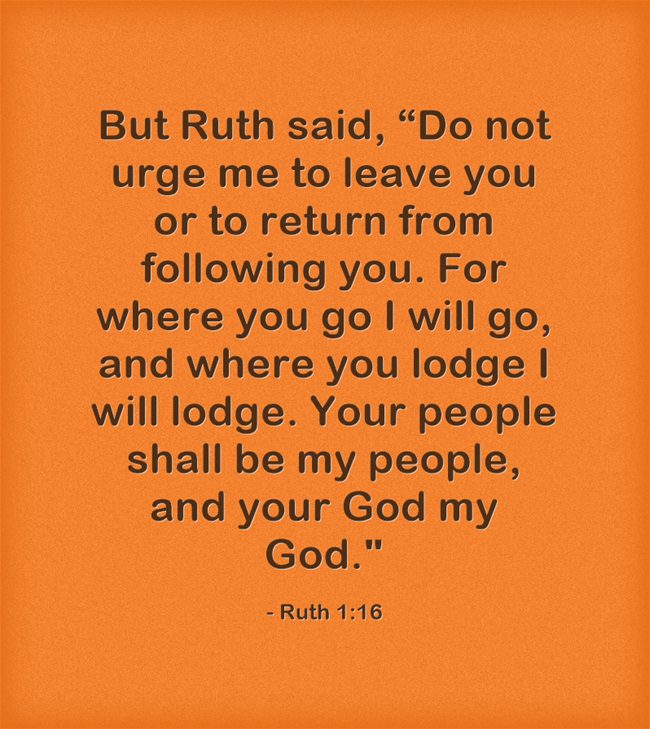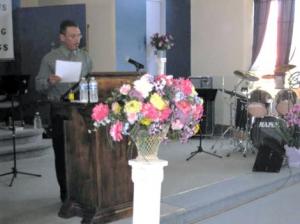Here are seven great Bible verses about Ruth found in the Book of Ruth.
Ruth 1:14 “Then they lifted up their voices and wept again. And Orpah kissed her mother-in-law, but Ruth clung to her.”
In the very beginning of the account of Ruth, they lived “In the days when the judges ruled there was a famine in the land, and a man of Bethlehem in Judah went to sojourn in the country of Moab, he and his wife and his two sons” (Ruth 1:1) and these sons “took Moabite wives; the name of the one was Orpah and the name of the other Ruth. They lived there about ten years” (Ruth 1:4) but “the husband of Naomi, died, and she was left with her two sons” (Ruth 1:3) but then Orpah and Ruth’s husbands died as well, so they were left with no one to provide for them.
Ruth 1:15 “And she said, “See, your sister-in-law has gone back to her people and to her gods; return after your sister-in-law.”
Here we see a hint of Ruth’s character. She is willing to go to a land that she’s never been to before and before a people that she has not lived among, yet Ruth clung to Naomi, and promised to go where she would go and her people would become Ruth’s people. That is a significant indication of Ruth’s humility and submission to her mother-in-law. She didn’t want to forsake Naomi, even after they all had lost their husbands and now their home.
Ruth 1:16 “But Ruth said, “Do not urge me to leave you or to return from following you. For where you go I will go, and where you lodge I will lodge. Your people shall be my people, and your God my God.”
After this, Naomi insisted that her daughter-in-law’s go back to their mother’s house but Ruth begged Naomi to go with her and in this very classic line, she said “where you lodge I will lodge. Your people shall be my people, and your God my God” but “But Naomi said, “Turn back, my daughters; why will you go with me? Have I yet sons in my womb that they may become your husbands? Turn back, my daughters; go your way, for I am too old to have a husband. If I should say I have hope, even if I should have a husband this night and should bear sons” (Ruth 1:11-12).
Ruth 2:2 “Ruth the Moabite said to Naomi, “Let me go to the field and glean among the ears of grain after him in whose sight I shall find favor.” And she said to her, “Go, my daughter.”
Naomi had good reason to return to her nation and wen to Bethlehem because “Naomi had a relative of her husband’s, a worthy man of the clan of Elimelech, whose name was Boaz” (Ruth 2:1) and so Ruth “set out and went and gleaned in the field after the reapers, and she happened to come to the part of the field belonging to Boaz, who was of the clan of Elimelech. And behold, Boaz came from Bethlehem. And he said to the reapers, “The Lord be with you!” And they answered, “The Lord bless you” (Ruth 2:3-4). Then, “Boaz said to his young man who was in charge of the reapers, “Whose young woman is this?” And the servant who was in charge of the reapers answered, “She is the young Moabite woman, who came back with Naomi from the country of Moab” (Ruth 2:5-6). Ruth had captured Boaz’ attention.
Ruth 2:8-9 “Then Boaz said to Ruth, “Now, listen, my daughter, do not go to glean in another field or leave this one, but keep close to my young women. Let your eyes be on the field that they are reaping, and go after them. Have I not charged the young men not to touch you? And when you are thirsty, go to the vessels and drink what the young men have drawn.”
This is the first indication that Boaz is interested in Ruth. He promises her protection and provisions, just like her previous husband may have done but Boaz is not just any man. He is in the lineage of King David and would follow in the line of the Son of David, Jesus Christ. This relationship is very much like that of Jesus and His bride who are destitute and impoverished and spiritually bankrupt. When Jesus marries His bride, the church, they will have provisions and protection for all time (John 3:16).
Ruth 2:10-11 “Then she fell on her face, bowing to the ground, and said to him, “Why have I found favor in your eyes, that you should take notice of me, since I am a foreigner?” But Boaz answered her, “All that you have done for your mother-in-law since the death of your husband has been fully told to me, and how you left your father and mother and your native land and came to a people that you did not know before.”
As we too must do before Christ, Ruth falls before Boaz and asks for his favor and as Ruth was a foreigner to the family of God, so too were we at one time. This is the compassion of God shown through Boaz who takes a woman outside of his own people and takes her to himself and so Ruth also will become part of the royal bloodline of Jesus Christ.
Ruth 3:3-4 “Wash therefore and anoint yourself, and put on your cloak and go down to the threshing floor, but do not make yourself known to the man until he has finished eating and drinking. But when he lies down, observe the place where he lies. Then go and uncover his feet and lie down, and he will tell you what to do.”
In these passages, Naomi instructs Ruth about the tradition and the law of the kinsmen redeemer, of whom Boaz is, and she then submits to Boaz, as we must submit before Christ and lay at His feet in a sign of humility and submission. Whoever doesn’t humble themselves will not be received by God or receive His grace because He is against those who are proud and will only extend His grace to those who are humble (James 4:6).
Conclusion
Ruth and Boaz have great symbolic meaning for the church and for Jesus Christ. As our Redeemer, we are grafted into the family of God, having once been outside of the family of faith, but when Jesus Christ becomes our Lord and Savior, He becomes our kinsman redeemer and His Father becomes our Father, and like Ruth, we can say “where you go I will go, and where you lodge I will lodge. Your people shall be my people, and your God my God” (Ruth 1:16).
Article by Jack Wellman
Jack Wellman is Pastor of the Mulvane Brethren Church in Mulvane Kansas. Jack is also the Senior Writer at What Christians Want To Know whose mission is to equip, encourage, and energize Christians and to address questions about the believer’s daily walk with God and the Bible. You can follow Jack on Google Plus or check out his book Teaching Children the Gospel available on Amazon.











